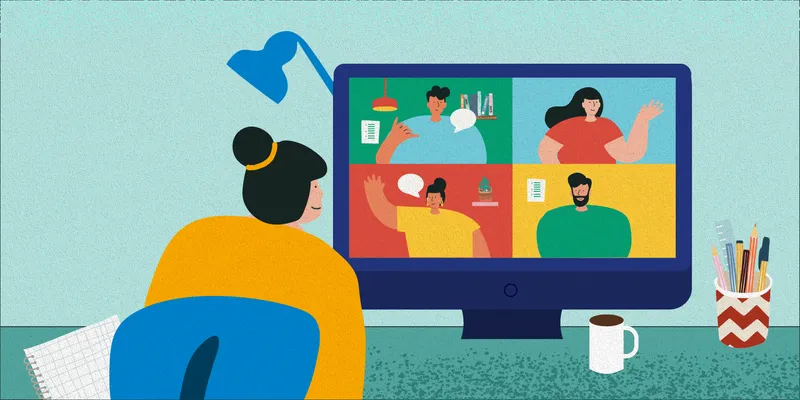Workplace friendships: A work bestie is great, but hey, there are some ground rules too
On International Friendship Day, we take a look at the one friendship that is rarely acknowledged yet central to our happiness — the work bestie, a confidant and peer who helps us grow both personally and professionally.
In my career of over two decades now, I have had many ‘work friends’, some of whom have crossed over professional boundaries and become an integral part of my life. My workplaces have often given me friends, who understand the microscopic worries of my life, who know exactly what I am going through, and who is probably going through the same.
A 2018 study by LinkedIn on “relationships at work” found that 46 percent of working professionals believe that work friends are important to their overall happiness. A Gallup research that surveyed 15 million employees all over the world found that 30 percent of employees have a ‘best friend’ at work and they are seven times more likely to be engaged in their jobs.
In fact, there is a phenomenon called the ‘work spouse’, a colleague with whom you share a close, platonic relationship, with high levels of disclosure, emotional bond, and mutual trust, honesty, loyalty, and respect.
According to Samira Gupta, Life Coach & Executive Presence Coach, while all workplace relationships require understanding, mutual respect, and willingness to collaborate, in some cases, “work spouse” relationships can become challenging and at times, dangerous.
On International Friendship Day, HerStory talks to professionals at all levels to understand these friendships, the various dynamics of the work spouse, and how you can nurture a work friendship without it becoming toxic.
Striking the right balance
Samira advises one to be cognisant of three aspects while maintaining these workplace friendships.
- With whom are you sharing and what benefit will it reap?
- What are you sharing — positive or negative?
- What will be the implication if the information gets leaked?
If the answer to any of these questions does not seem promising, you should refrain from sharing it.
Dr Jini Gopinath, Chief Psychologist at YourDost, says, “The concept came into being because technically you spend half your life at work. Studies say that 35-45 percent of people globally have work spouses. There is a special emotional bond and intuitive communication that happens with your work spouse. With a work spouse, you find comfort, a sense of relief, and ease of connection. There is care, concern, and support that comes from a work spouse relationship.”
However, a cause for concern arises when it transitions from a platonic relationship to a more intimate one.
“If you maintain boundaries, be mindful of them and the relationship will be productive. Otherwise, it can get negative and impair the relationship. When the boundaries get blurred, it’s what we call an enmeshed relationship where you are entangled in this difficult situation,” she adds.
Jini believes “familiarity breeds contempt” holds for workplace friendships as well.

“Sometimes, workplace environments can become toxic due to mindless friendships, gossip sessions, and unprofessional communication,” she says.
For Pooja Jain, Country Head, Swiss Education Group, it’s important to create a fine balance between being a friend and colleague not only to avoid an acrimonious work environment but also to not lose out on good friendships.
Antara Khaund, a PR professional, says we mustn’t blur out professional lines. “These boundaries also help establish a safe space where we can communicate, ask for help, re-group, and take our time and a breather during long and stressful days,” she adds.
Having a work BFF can be a double-edged sword. On one hand, it can boost morale, increase productivity, and help retain good people. “But, it can also lead to bad habits, unhealthy conversations, and employees leaving in waves if you have a toxic culture,” says Sonali Saikia, a working professional.
Some common workplace faux pas, Samira says, include discussing strained boss-employee relationships with a colleague, disclosing confidential information no matter how trustworthy that individual is, gossiping about other colleagues, over-sharing personal information, asking inappropriate questions, and mindlessness in behaviour and communication.
“If your mind and actions are aligned with your vision, drawing a boundary will not be a big task. Hence, identify your professional goals, list out actions that will help you get closer each day, avoid distractions, and continue to learn,” she adds.
Healthy results
“Studies have shown that good workplace relationships improve productivity, and friendship counts among these relationships,” says Jini.
However, the caveat here is to establish boundaries and be mindful of them.
According to Antara, she has found sound, independent, strong individuals, who have helped her grow and succeed.
“My work friends have reinforced my belief in true, healthy friendships, and have brought out the best in me professionally. I am more confident, happy, and at ease, because I know that I have a great group of people to fall back on who understand me and understand my work,” she says.
Jini explains that from a cognitive standpoint, the workplace provides individuals access to readily available perspectives in different situations.
“Neurologically, interactions with a friend can release oxytocin, a happy hormone. In a pressure cooker, how a whistle releases the steam, friends at workplaces help you to release your stress, when you talk out your troubles with them. Imagine a long day at work and you have a coffee break with a friend at work and it just destresses you.”
The ones that cross over
However, there are some workplace friendships that go beyond the office and the professional relationship. And no, we are not talking about office romances.
Pooja, for example, realised that some of her closest friends are people she met at work.
Then, Kainat, who joined 91springboard straight out of college, found her current best friend and flatmate in a colleague. “We became friends while working together at the Delhi hub. Our friendship and continued to grow even though I had moved to Bombay after four months. The pandemic got me back to Delhi and we decided to move in together (we are not romantically involved in any way). We are also raising an Indie pup who is our permanent and most important housemate.”
So, how do you decide whether you want a work spouse or not?
Tanvi Dubey, who works in the investment space, puts it succinctly, "Like everything else in this world, workplace friendships, too, have their pros and cons. I have made friends at the workplace, who continue to be a part of my life. All of these relationships have been about mutual respect, understanding, and support. Friends at the workplace can also make good cheerleaders and sounding boards."
So, go ahead, find your work besties and work spouses. But let the relationship cultivate and grow over time — with trust, faith, and balance.
Edited by Saheli Sen Gupta









